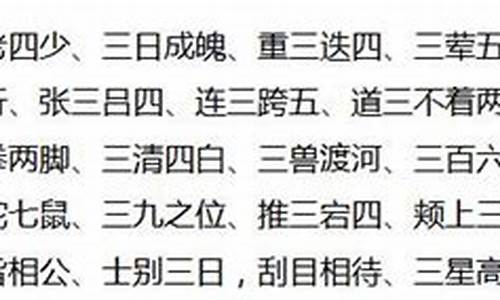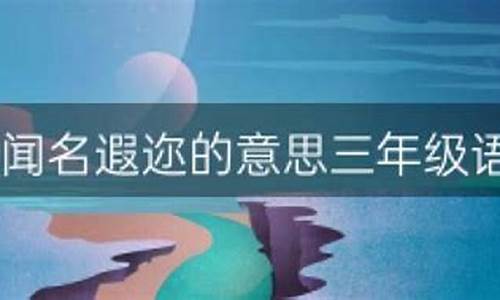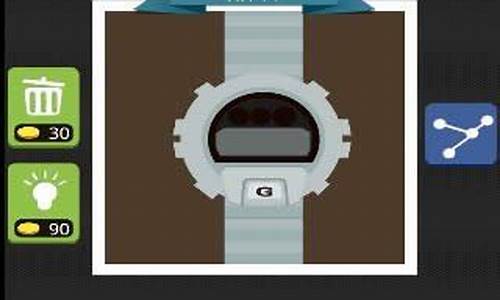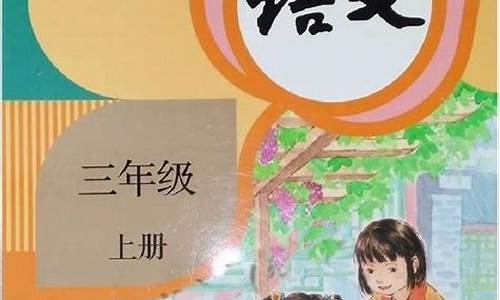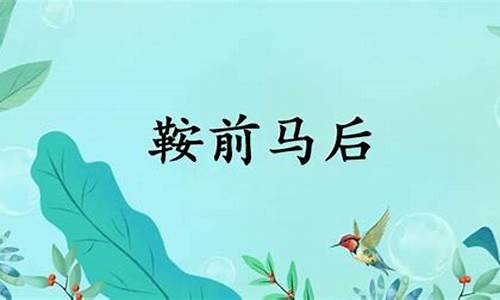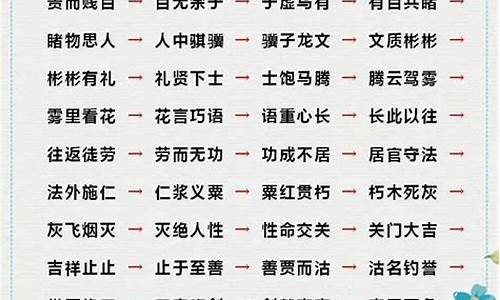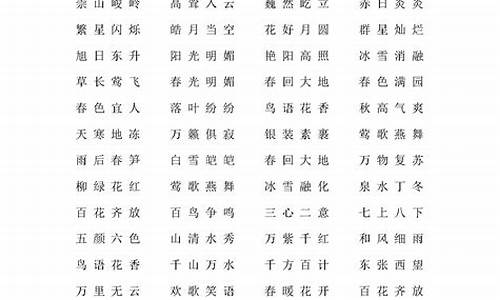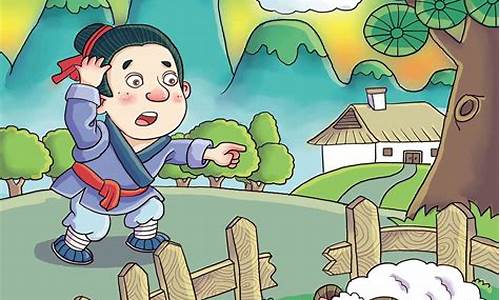英文讲成语故事
下面将有我来为大家聊一聊英文讲成语故事的问题,希望这个问题可以为您解答您的疑问,关于英文讲成语故事的问题我们就开始来说说。
1.谁知道揠苗助长这个故事用英文怎么翻译 急需。
2.少儿英语成语故事:毛遂自荐
3.卧薪尝胆成语故事英文版
4.大家帮忙写两个英文的短文。翻译两篇成语故事,别太长,每篇三百词左右,汉语英语都要
5.中国成语故事《九牛一毛》中英文版

谁知道揠苗助长这个故事用英文怎么翻译 急需。
谁知道揠苗助长这个故事用英文怎么翻译 急需。
揠苗助长(To Pull up the Seedlings to Help Them Grow)
Once upon a time, an old farmer planted a plot of rice. Everyday he went to the field to watch the seedlings grow. He saw the young shoots break through the soil and grow taller each day. But still, he thought they were growing too slowly. He got impatient with the young plants. "How could the plants grow faster?" He tossed in bed during the night and could not sleep. Suddenly he hit upon an idea. He had an idea not wait for daybreak. He jumped out of the bed and dashed to the field. By the moonlight, he began working on the rice seedlings. One by one, he pulled up the young plants by half an inch. When he finished pulling, it was already morning. Straightening his back, he said to himself, "What a wonderful idea! Look, how much taller the plants he grown one night!" With great satisfaction, he went back home. He told his son what he had done in a triumphant tone. His son was shocked. Now the sun had risen. The young man was heart-broken to see all the pulled-up young plants dying.
People now use " Ba Miao Zhu Zhang" to describe the behior of those who are too eager to get something done only to make it worse. The idiom is a bit like the English proverb "Haste makes waste" ------to spoil things by excessive enthusia *** .
异译
古时候宋国有个农夫,种了稻苗后,便希望能早早收成。
每天他到稻田时,发觉那些稻苗长得非常慢。他等得不耐烦,心想:"怎么样才能使稻苗长得高,长很快呢?想了又想,他终了想到一个"最佳方法",就是将稻苗拨高几分。
经过一番辛劳后,他满意地扛锄头回家休息。然后回去对家里的人表白:"今天可把我累坏了,我帮助庄稼苗长高一大截!"
他儿子赶快跑到地里去一看,禾苗全都枯死了。
人们现在用拔苗助长形容急于求成,违法客观规律,只会把事情办坏。成语有点像西方的谚语“欲速则不达”——过度的热情只会把事情办坏
揠苗助长后面的翻译天下不助苗生长的人实在很少啊。以为没有用处而放弃的人,就像是不给禾苗锄草的懒汉。妄自帮助它生长的,就像拔苗助长的人,非但没有好处,反而危害了它。
这段文字出自《孟子.公孙丑上》,是“拔苗助长”成语的典故。孟子借此喻向公孙丑说明如何培养人的浩然正气,要靠义与道相配合,需要靠不断累积正义之举而获得,且要不听培养,不能停止和忘记,不能贪快妄进。
揠苗助长 翻译(字词也要0就是不按寻常路
古文 《揠苗助长》翻译一句话天下人不犯这种拔苗助长错误的是很少的。认为养护庄稼没有用处而不去管它们的,是只种庄稼不除草的懒汉; 一厢情愿地去帮助庄稼生长的;就是这种拔苗助长的人,不仅没有益处,反而害死了庄稼
揠苗助长这些词语还有什么欲速不达 [yù sù bù dá]
生词本
基本释义
欲:想要。想求快速,反而不能达到目的。
出 处
《论语·子路》:“无欲速;无见小利。欲速则不达;见小利则大事不成。”
例 句
磨刀不误砍柴工,宁可少生产一些,也要先把装置维修好,不然~
求揠苗助长故事中“予”在文中指“我”读音()
yu 三声
守株待兔:株:露出地面的树根。原比喻希图不经过努力而得到成功的侥幸心理。现也比喻死守狭隘经验,不知变通。典出自《韩非子·五蠹》记载:战国时宋国有一个农民,看见一只兔子撞在树根上死了,便放下锄头在树根旁等待,希望再得到撞死的兔子。结果自然再无所获!近义词:墨守成规。
揠苗助长原文断句揠苗助长
(选自《孟子.公孙丑章句上》)
宋人有悯其苗之不长而揠之者,芒芒然归,谓其人曰:“今日病矣!予助苗长矣。”其子趋而往视之,苗则槁矣。
天下之不助苗长者寡矣。以为无益而舍之者,不耘苗者也;助之长者,揠苗者也。非徒无益,而又害之。
翻译 :
战国时候,宋国有个农民种了一块地。栽下禾苗后,他希望它很快长高。结出果实。他每天都到地里去看,但禾苗长得很慢,他心里非常着急。怎样才能让禾苗尽快长高呢?
天气很好,艳阳高照,他到地里去把禾苗一一拔高。回家后,他很得意地对家里人说:“累死我了,我帮助禾苗长高了。”他的儿子到地里一看,禾苗全枯死了。
拔苗助长:原作“揠苗助长”,后作“拔苗助长”。
如何讲解“揠苗助长”这个成语中华成语大词典
揠苗助长
拼音:yà miáo zhù zhǎng
解释:揠:拔。把苗拔起,以助其生长。比喻违反事物发展的客观规律,急于求成,反而把事情弄糟。
出处:《孟子·公孙丑上》:“宋人有闵其苗之不长而揠之者,茫茫然归,谓其人曰:‘今日病矣,予助苗长矣。’其子趋而往视之,苗则槁矣。”
示例:对学生的教育既不能~,也不能放任自流。
近义词:欲速不达
反义词:放任自流、循序渐进
歇后语:宋国的农夫
语法:作主语、宾语;同“拔苗助长”
英文:spoil things by excessive enthusia *** as one who tries to help the shoots grew by pulling them up
成语故事:从前宋国一个农夫担心自己田里的禾苗长不高,就天天到田边去看。三天过去了,禾苗没见动静。他想出一个办法,就急忙奔到田里,把禾苗一棵棵拔高一些。回去对儿子说禾苗长高了一大截,儿子跑到田里一看,禾苗全都枯死了
揠苗助长这四个字的意思解释:揠:拔。把苗拔起,以助其生长。比喻违反事物发展的客观规律,急于求成,反而把事情弄糟。
出自:《孟子·公孙丑上》:“宋人有闵其苗之不长而揠之者,茫茫然归,谓其人曰:‘今日病矣,予助苗长矣。’其子趋而往视之,苗则槁矣。”
示例:对学生的教育既不能~,也不能放任自流。
近义词:欲速不达
反义词:放任自流、循序渐进
语法:连动式;作主语、宾语;含贬义
刻舟求剑的中文解释
以下结果由汉典提供词典解释
解释:比喻不懂事物已发展变化而仍静止地看问题。
出自:《吕氏春秋·察今》》:“楚人有涉江者,其剑自舟中坠于水,遽契其舟曰:‘是吾剑之所从坠。’舟止,从其所契者入水求之。舟已行矣,而剑不行,求剑若此,不亦惑乎?”
示例:似你这样寻根究底,便是~,胶柱鼓瑟了! ◎清·曹雪芹《红楼梦》第一百二十回
近义词:守株待兔、墨守成规
反义词:看风使舵、见机行事
语法:连动式;作谓语、定语、状语;含贬义
"揠苗助长"的故事形成于哪个时期春秋战国
少儿英语成语故事:毛遂自荐
塞翁失马Blessing or Bane
战国时期,靠近北部边城,住着一个老人,名叫塞翁。塞翁养了许多马,一天,他的马群中忽然有一匹走失了。邻居们听说这件事,跑来安慰,劝他不必太着急,年龄大了,多注意身体。塞翁见有人劝慰,笑了笑说:“丢了一匹马损失不大,没准会带来什么福气呢。”
邻居听了塞翁的话,心里觉得很好笑。马丢了,明明是件坏事,他却认为也许是好事,显然是自我安慰而已。过了几天,丢失的马不仅自动返回家,还带回一匹匈奴的骏马。
邻居听说了,对塞翁的预见非常佩服,向塞翁道贺说:“还是您有远见,马不仅没有丢,还带回一匹好马,真是福气呀。”
塞翁听了邻人的祝贺,反而一点高兴的样子都没有,忧虑地说:“白白得了一匹好马,不一定是什么福气,也许惹出什么麻烦来。”
邻居们以为他故作姿态纯属老年人的狡猾。心里明明高兴,有意不说出来。
塞翁有个独生子,非常喜欢骑马。他发现带回来的那匹马顾盼生姿,身长蹄大,嘶鸣嘹亮,膘悍神骏,一看就知道是匹好马。他每天都骑马出游,心中洋洋得意。
一天,他高兴得有些过火,打马飞奔,一个趔趄,从马背上跌下来,摔断了腿。邻居听说,纷纷来慰问。
塞翁说:“没什么,腿摔断了却保住性命,或许是福气呢。”邻居们觉得他又在胡言乱语。他们想不出,摔断腿会带来什么福气。
不久,匈奴兵大举入侵,青年人被应征入伍,塞翁的儿子因为摔断了腿,不能去当兵。入伍的青年都战死了,唯有塞翁的儿子保全了性命。
Near China's northern borders lived a man well versed in the practices of Taoism. His horse, for no reason at all, got into the territory of the northern tribes. Everyone miserated with him.
"Perhaps this will soon turn out to be a blessing," said his father.
After a few months, his animal came back, leading a fine horse from the north. Everyone congratulated him.
"Perhaps this will soon turn out to be a cause of misfortune," said his father.
Since he was well-off and kept good horses his son became fond of riding and eventually broke his thigh bone falling from a horse. Everyone miserated with him.
"Perhaps this will soon turn out to be a blessing," said his father.
One year later, the northern tribes started a big invasion of the border regions. All able-bodied young men took up arms and fought against the invaders, and as a result, around the border nine out of ten men died. This man's son did not join in the fighting because he was crippled and so both the boy and his father survived.
卧薪尝胆成语故事英文版
volunteer to do sth/remend oneself毛遂自荐
In the Warring States Period, the State of Qin besieged the capital of the State of Zhao.战国时代,秦国军队攻打赵国的都城。
Duke Pingyuan of Zhao planned to ask the ruler of the State of Chu personally for assistance.He wanted to select a capable man to go with him. 赵国的平原君打算亲自到楚国去请救兵,想挑选一个精明能干的人一同前去。
A man called Mao Sui volunteered. 有一个名叫毛遂的人,自告奋勇愿意同去。
When the negotiactions between the two states were stalled because the ruler of Chu hesitated to send troops, Mao Sui roached him, brandishing a sword. At that, the ruler of Chu agreed to help Zhao, against Qin.平原君到楚国后,与楚王谈了半天,没有一点结果。毛遂怒气冲冲地拿着宝剑,逼近楚王,终于迫使楚王答应出兵,与赵国联合共同抵抗秦国。
This idiom means to remend oneself.“毛遂自荐”这个成语用来比喻自己推荐自己,不必别人介绍。
文化链接
英文中“毛遂自荐”可以说成“volunteer to do sth”,“volunteer”既可以作名词,也可以作动词,作名词时的意思是“志愿者”,作动词就可以解释为“志愿去做什么事”,就是“毛遂自荐”啦~
我们来一起看几个例句吧~
Our pany volunteered to support and help the victims. 我们的公司毛遂自荐来帮助受灾灾民。
You can volunteer to work one or multiple shifts。你可以毛遂自荐做单班制,也可以选择多班制。
大家帮忙写两个英文的短文。翻译两篇成语故事,别太长,每篇三百词左右,汉语英语都要
During the Spring and Autumn period (770-476BC), the State of Wu launched an attack against the State of Yue. The King of Wu was seriously wounded and soon died. His son Fu Chai became the new King. Fu was determined to get revenge. He drilled his army rigidly until it was a perfect fighting force. Three years later, he led his army against the State of Yue and caught its king Gou Jian. Fu took him to the State of Wu.
春秋时期,吴国和越国之间进行了一场战争,吴王不幸受了重伤,不久就死了。他的儿子夫差作了吴国的新国王,他发誓要替父亲报仇。于是,他严格的.操练他的士兵,把他们训练成了一支非常厉害的军队。三年以后,他对越国发动了战争,抓住了越王勾践,把他带回了吴国。
In order to enge his father's death, Fu let him live in a shabby stone house by his father's tomb and ordered him to raise horses for him. Gou pretended to be loyal to Fu but he never forgot his humiliation. Many years later, he was set free. Gou secretly accumulated a military force after he went back to his own state. In order to make himself tougher he slept on firewood and ate a gall-bladder before hing dinner and going to bed every night. At the same time he administered his state carefully, developing agriculture and educating the people. After a few years, his country became strong. Then Gou seized a forable opportunity to wipe out the State of Wu.
为了复仇,夫差让勾践住在他父亲墓旁的破石屋里墓、喂马。勾践表面上服从,心里面却想着复仇。几年以后,勾践被放回越国。他立刻开始秘密聚集一支军队。为了提醒自己不要忘了报仇,他睡在柴上,还每天在吃饭睡觉前尝一尝苦胆。同时,他专心治理国家,大力发展农业,加强民众教育。几年后,越国又变得强大起来,然后,勾践抓住一个适当的机会消灭了吴国。
Later, people use it to describe one who endures self-imposed hardships to strengthen one's resolve to realize one's ambition.
后来,人们用它来形容人刻苦自励以达到自己定下的目标。
中国成语故事《九牛一毛》中英文版
汉语:
《不可救药》
周朝有位卿士叫凡伯。凡伯不但有诗才,而且善于治理国事。后来,他在周厉王身边辅佐朝政。可是,周厉王飞横跋扈,枉法断事。奸臣则百般诌媚讨好。凡伯直言相劝,列数朝政弊端,奸臣却在周厉王耳边说他的坏话。周厉王对凡伯十分厌烦,从此,奸臣出入宫廷,不把凡伯放在眼里。凡伯十分愤慨,写了一首诗,后来收入《诗经》。诗中抨击奸臣说:“作恶多端,不可救药!” “不可救药”:病重到不能用药救活。后比喻事物坏到无法挽救的地步。
英语:
Of the remedy Chou Secretary told fanbo. Where the primary is not only a poet, and is good at administration. Later, his assistant at King Li of Zhou side Affairs of State. However, Zhou liwangfei cross-ridden, bending the broken things. Treacherous court official tried Chan Mei Woo. Fanbo directly persuade, Affairs of State abuses, treacherous court official says he was King Li of Zhou ear ill. King Li of Zhou fanbo very boring, since then, treacherous court official access to the Palace, not primary heart. Fanbo very indignant, wrote a poem, later ine the book of songs. Poem attacking treacherous court official said, "evil and hopeless! "" Hopeless ": drugs sed too ill to fail. Metaphor after something bad to the point of irretrievable.中文:
围魏救赵:战国时,魏军围困赵国京城邯郸。赵国向齐国求救,齐威王命田忌为将,孙膑为军师,出兵救赵。田忌原想直接引兵去救赵国的邯郸,孙膑主张引兵去围攻魏国的京城大梁,魏必回兵自救,这样,不但能解除赵国的围困,还能使魏军疲劳不堪。田忌纳了孙膑的策略,引兵直奔大梁。魏军闻讯急忙撤回围攻邯郸的部队,星夜回军援救大梁。走到桂陵,齐军以逸待劳迎击魏军。魏军大败,几乎全军覆没。
英文:
Se Zhao by besieging the capital of Wei: the warring States period, the Wei army siege on Zhao capital Handan. Zhao Qi for help, Qi Wei Wang Mingtian cream, Sun Bin to armies, troops rescue Zhao. Tianji wanted to directly lead soldiers to rescue Zhao, Handan, Sun Bin advocated direct soldiers to besiege Wei city of the crossbeams, Wei Bi back to help themselves, so that not only the lifting of the siege of Zhao, Wei Jun can he a difficult time. Tianji has adopted the strategy of Sun Bin, soldiers went straight beam. Wei Jun leaders hurried to withdraw of troops besieging Handan, starry night back to army rescue beam. Go to Gui Ling and Qi Jun Fabian acting Wei Jun. Wei Jun defeated, almost all.中文:
语小故事----疑邻盗斧
从前有个乡下人,丢了一把斧子。他以为是邻居家的儿子偷去了,于是处处注意那人的一言一行,一举一动,越看越觉得那人像是盗斧的贼。后来,丢斧子的人找到了斧子,原来是前几天他上山砍柴时,一时疏忽失落在山谷里。找到斧子后,他又碰见了邻居的儿子,再留心看看他,怎么也不像贼了。
英文:
----O suspected stolen hammer language small story there was once a countryman, lost an ax. He thought it was a neighbor's son was stolen, so pay attention to that man's deeds, every move, the more the more thought that man is a thief who stole the axe. Later, the man threw an axe to the axe, turned out to be a few days ago when he cut firewood in the mountains, oversight the lost Valley. After found an axe, he met the neighbor's son, and then look to see if he, not in any way as a thief.中国成语故事《九牛一毛》中英文版
Li Ling was a great general during the time of emperor Han Wu-di (hàn wǔ dì汉武帝). He was a very good fighter, and he won every battle.
One time, however, Li Ling's troops were so hopelessly outnumbered by the Huns that although they fought brely, the whole army was soon taken captive.
Li Ling shamefully surrendered for the moment, planning to wait for an opportunity to strike back.
But when news of the surrender reached the capital, the emperor's jealous ministers began to degrade Li Ling in front of the emperor.
What he heard made the emperor so angry that he had Li Ling's wife and mother put to death.
Ze-ma Chian, who had always respected Li Ling, believed that he wouldn't surrender without a reason, and urged the emperor not to believe rumors.
Sz-ma Chian then wrote a long letter to a friend, saying, "I am now in the middle of writing a history book. If I die, it will be as if one ox in a group on nine were to lose a single hair. I am willing to withstand punishment in order to plete this book." Sz-ma Chian finally did finish his book - the very famous Shr-Ji.
This time, the emperor grew angry at Sz-ma Chian, and locking him up, punished him severely.
好了,今天关于“英文讲成语故事”的话题就讲到这里了。希望大家能够通过我的介绍对“英文讲成语故事”有更全面、深入的认识,并且能够在今后的实践中更好地运用所学知识。
声明:本站所有文章资源内容,如无特殊说明或标注,均为采集网络资源。如若本站内容侵犯了原著者的合法权益,可联系本站删除。

